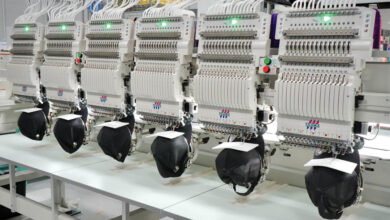If you don’t think shop culture is a big breaking point for your new hires, think again. A Robert Half survey found that no matter how qualified a person is for a job or how excited they are to join your team, more than a third of U.S. workers would turn down a perfect job offer if the corporate culture isn’t on point.
Let’s look at what corporate culture is, and six ways you can work toward improving it.
What’s company culture?
It’s all about the general tenor or attitude of your business. When someone is considering joining your company, there are a lot of things they might take notice of, including:
- How your employees interact with each other
- How your employees interact with customers and clients
- Your shop’s mission and values
- The daily decisions managers and employees make that show these values
- The causes or social issues your shop supports
- Your leadership style
- The work environment of your physical location
All of this adds up to your “corporate culture.” But what impact does it have on your business? Your shop culture influences all facets of your shop like whether your employees enjoy coming to work each day, if they want to work hard for you, and if your customers want to give you their business. It’s something that can have a huge impact on just how successful your shop becomes, and that’s why so many companies are putting more focus on it today.
Ask yourself these questions to see if your shop culture needs a makeover
There are questions you can ask yourself when deciding if your shop needs a culture change. If you’re honest and open with your employees, you can also ask them to provide you with direct feedback about what they think the answers to these questions are:
- Do your employees enjoy their job or do they dread coming in each day? Why?
- How do your employees define your company mission and goals?
- What do your employees think about your company’s ethics and work environment?
- Do your employees see bias or partiality in the way some employees are treated?
- Do you allow input from your employees or is it a “my-way-or-the-highway” style of management?
- Do employees feel empowered to serve customers at the highest level?
- Are your employees just waiting for the day they can quit and move on to another job?
Answering these questions can really help you figure out if what’s happening in your business is aligning with your overall vision and goals. If it’s not, then you can start honing in on what you can do to make your employees’ experience even better.
6 steps you can take to make over your company culture
1. Start with respect
In an SHRM survey, employees were asked what the biggest factor was in determining their job satisfaction. The number one answer? “Respect.” With that in mind, ask yourself how you can show employees more respect in your shop. Do you communicate with them clearly? Do you trust them to make decisions and empower them to do their jobs without micromanaging them? These steps go a long way toward showing you respect them.
2. Set clear expectations and policies
Communicate all the rules and regulations governing your shop to all employees. This should be part of your onboarding process, as well as part of all-shop meetings when needed. Specify everything you consider a policy in your employee manual. You don’t want to be in the position of telling an employee they violated a policy they didn’t know existed. If you don’t have a dedicated HR person, you might want to hire an HR consultant to help you create policies and procedures, as well as an onboarding strategy for newcomers.
3. Focus on fairness
No one likes to work for a boss who plays favorites. So, when it comes to accountability, ask yourself: Do I show fairness and equality to all my employees? If your answer is no, there’s a pretty good chance your employees noticed. Your goal is to create policies that promote fairness for all employees. If a team member isn’t pulling their weight, you need to address it quickly. By not facing an employee issue head-on and fast, you’re going to create a hierarchy in your shop’s culture of the privileged and non-privileged — and that quickly leads to a toxic environment. Again, this is where hiring an HR generalist full- or part-time can help you deal with these situations correctly.
4. Take care of your people
You have thousands (or even hundreds of thousands) of dollars of decorating equipment in your shop that would set you back a small fortune if they got damaged. But, what’s actually the most valuable asset in your shop? Your employees.
Start with reviewing their compensation packages: Are their wages competitive to what others in your industry and region are making? Do they receive performance bonuses and yearly raises? Do they receive paid time off? Do they receive benefits like health insurance? Be sure that you’re offering attractive pay and benefits to attract and retain good people.
Second, look at how you treat your employees on a daily basis: Do you have an open-door policy so employees can come to you with questions or issues? Do you give them fun T-shirts to wear at work? Do you keep snacks in the break room? Do you have holiday parties and summer barbecues? Do you meet with your team for monthly or quarterly lunches to discuss your overall goals? Basically, take a bird’s-eye view of everything you’re doing to make the work-life of your employees comfortable and more enjoyable.
5. Place an emphasis on teamwork
It’s important to remember that your whole team is there to work together toward your shop’s goals. Encourage team building and camaraderie, so people are motivated to excel. When work gets backed up and it’s time for “all hands on deck,” then there really should be an all-hands-on-deck mentality within the group. This is why holding different fun events, group meetings, and recognizing employees, goes a long way to building that A-team.
6. Don’t forget to make it fun
Finally, you can change the climate of your shop by making it fun. Some shops create screen-printing music playlists that they broadcast across their shop to motivate employees. Others have pizza Fridays, celebrate shop birthdays once a month or stock ice pops during the hot summer months for employees to grab. Still, others have “bring your pet to work day,” or design and print cool shop T-shirts for everyone to wear. Fun doesn’t have to equal expensive. Creating a fun work environment has everything to do with an attitude of “work hard, play hard.”
People want to work in a positive environment with people they like and where they feel valued. That’s why your shop culture can either attract the best workers or force them to flee in droves. By taking the time to show you care and working with your employees fairly, you can positively change your shop culture for the better.




